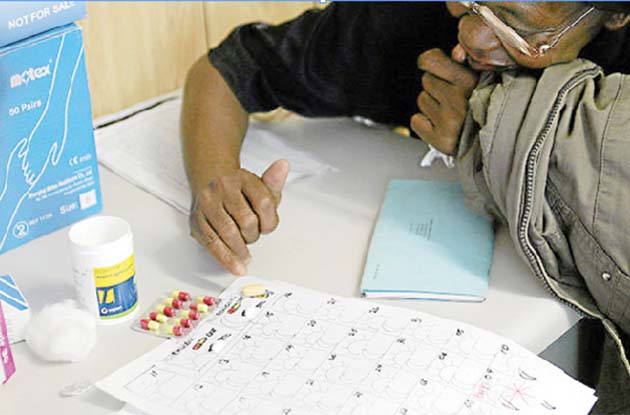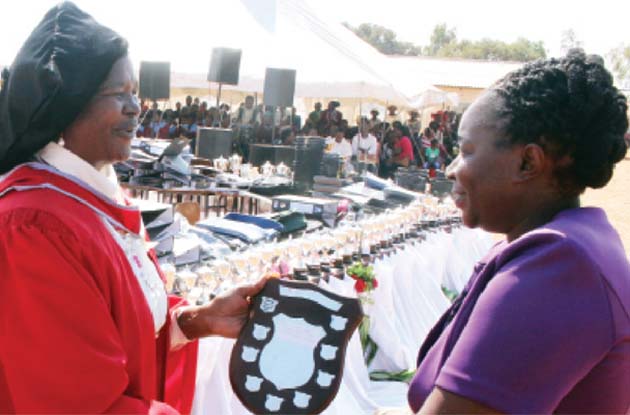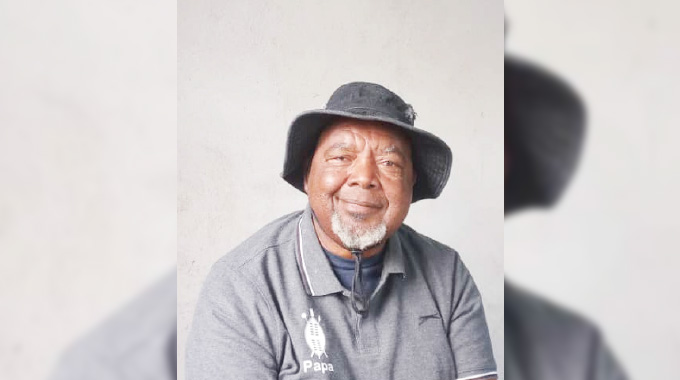AIDS DRUG SHOCK . . . Zim ART patients overdosed, scientist reveals

 Paidamoyo Chipunza Harare Bureau
Paidamoyo Chipunza Harare Bureau
MORE than 20 percent of Africans taking Efavirenz — a first line antiretroviral drug used in the management of HIV and Aids could be taking an overdose — a local scientist, Professor Collen Masimirembwa, has revealed.
In an interview on his latest scientific development aimed at assessing the safety and effectiveness of medicines in African populations, Prof Masimirembwa who is the president and chief scientific officer with the African Institute of Biomedical Science and Technology (AiBST) said research had shown that the concentration of Efavirenz in Africans was higher compared to Europeans taking the same medicines.
“Over 20 percent of patients in Zimbabwe and in Africa for that matter, are overdosed when they are being given the current standard dose.
“We’ve now realised that the difference is because of the genetic make-up of African people where they have a variance which reduces their capacity to remove the drug from the body once given the standard dose. Caucasians on the other hand, have a variance that quickly breaks down the drug (Efavirenz) in their bodies faster than in Africans,” said Prof Masimirembwa.
He said the high concentration of residual Efavirenz in Africans causes more side effects in them compared to their counterparts.
He said this is the reason why most HIV positive people taking Efavirenz experience multiple side effects compared to others in some parts of the world.
Prof Masimirembwa said AiBST had come up with a genetic test to ascertain the possibility of reduction of Efavirenz dose in the product to match with the African genetic make-up to reduce the side effects.
Some of the drug’s side effects are diarrhoea, skin rash, nausea, dizziness, lack of concentration, headache, fatigue, vomiting, and anorexia.
“The genetic tests and the dosing algorithm of how to reduce the dose will have a huge impact because it will mean people will be treated safely, which is the most important part of treatment,” said Prof Masimirembwa.
He said their research on Efavirenz was precipitated by reports of people living with HIV who were experiencing side effects to the drug.
“Many people were complaining of side effects, then we said why is it that way? When we measured the concentration, we realised that it was high,” he said.
He said in response to that, AiBST, in partnership with the Government and Harare City Council has set up a research unit at Chitungwiza Central Hospital meant to assess the safety and effectiveness of medicines in African populations before they are introduced into the market.
He said once accreditation and the other paper- work is finalised, all clinical trials will be conducted at Chitungwiza Central Hospital. Samples will be sent to Wilkins Hospital in Harare, which houses AiBST laboratories.
“Indeed, there is clear evidence that the difference in the genetic make-up can affect a number of drugs, but not all drugs, that is why this project is extremely important.
“We’re now saying with a clinical trial unit, those pharmaceutical companies can work with us at an early stage to make sure that their products are safe and effective for African populations,” he said.
Professor Masimirembwa said one such company is Swiss-based Novartis.
Novartis is also assisting AiBST with technical and financial support to set up the research units and ensure that they are of international standards.
So far, the pharmaceutical company has donated research equipment worth $2 million to aid in research processes and is assisting with training of staff who will be conducting the research.
Novartis’ head of global scientific development Mr Marcelo Gutierrez said his organisation partnered with AiBST after realising that medical needs across the globe were diverse.
He said in Africa, they were also working with similar institutions in Nairobi, Ghana, South Africa and Tanzania to understand the needs of different populations.
“We realised that there is a huge diversity of patients worldwide and in order for us to understand this diversity, we’ve to partner with scientists from diverse backgrounds in order to help us understand various diseases. We can only do that by partnering with institutions like AiBST to help us provide safe and effective medicines as quickly as possible,” said Mr Gutierrez.
Local pharmaceutical companies are sending their samples to India or Germany for safety assessment.










Comments